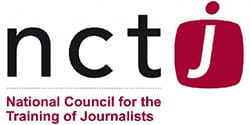About this course
A vocational programme taught using industry-standard facilities so you gain the hands-on experience you will need in your day-to-day work as a journalist.
- Accredited by the National Council for the Training of Journalists (NCTJ)
- Practical training in research and writing as well as multi-media production
- Teaching from journalists with many years' experience and links to local newspapers, TV companies and radio stations
- Opportunities for industrial placements with media organisations
- Taught in the £38 million Redmonds Building with industry-standard facilities including newsrooms, studios, editing booths
- Opportunity to sit professional National Council for the Training of Journalists (NCTJ) exams and acquire their full diploma
- Publish work on LJMU Journalism's Mersey Live website
This highly vocational Master's programme provides practical training in multi-media journalism and will further your understanding of the law and how public bodies work. You will also develop skills in analysis and interpretation, initiative and research, which are useful in any career.
Course modules
Discover the building blocks of your programme
This course is currently undergoing its scheduled programme review, which may impact the advertised modules. Programme review is a standard part of the University’s approach to quality assurance and enhancement, enabling us to ensure that our courses remain up to date and maintain their high standard and relevancy.
Once the review is completed, this course website page will be updated to reflect any approved changes to the advertised course. These approved changes will also be communicated to those who apply for the course to ensure they wish to proceed with their application.
Your programme is made up of a number of core modules which are part of the course framework. Some programmes also have optional modules that can be selected to enhance your learning in certain areas and many feature a dissertation, extended report or research project to demonstrate your advanced learning.
Further guidance on modules
Modules are designated core or optional in accordance with professional body requirements, as applicable, and LJMU’s Academic Framework Regulations. Whilst you are required to study core modules, optional modules provide you with an element of choice. Their availability may vary and will be subject to meeting minimum student numbers.
Where changes to modules are necessary these will be communicated as appropriate.
Core modules
Optional Modules
Professional accreditation/links
Students will have an opportunity to sit professional National Council for the Training of Journalists (NCTJ) exams and acquire their full diploma during their studies.
Students studying on NCTJ accredited courses are more appealing to employers looking for multi-skilled recruits who know the fundamentals of journalism and can operate to professional standards.
Find out more about the NCTJ Journalism Diversity Fund to help cover some costs of training.

Your Learning Experience
An insight into teaching on your course
Study hours
Full-time students can expect 16-18 contact hours per week, usually over three full days (subject to timetabling). The remainder of the week will be spent with a combination of self-directed study and practical work.
Teaching methods
You will receive taught elements through a mixture of seminars, workshops and tutorials. One to one tutorials will be combined with group seminars/workshops, with some bespoke workshops for smaller groups.
You will have access to the Liverpool Screen School's industry-standard facilities in Redmonds Building, helping you secure the hands-on experience you will need in your day-to-day work as a journalist. These facilities include edit suites, newsrooms, radio sound studios and a TV studio.
Applied learning
Our strong links with local newspapers, television companies and radio stations mean that there will be opportunities for invaluable work experience during the course, and you will be encouraged to get involved with various student media outlets in Liverpool, including our own website.
The modules and assessments for the programme will reflect the NCTJ syllabus and will include essential journalism, news writing, multi-platform journalism, media law, public affairs and shorthand.
Students will hear from a range of guest speakers, such as:
- Liam Thorp Politics Editor, Liverpool Echo (Reach Plc)
- Vidar Hardeng Law and Ethics diversity consultant ITV News
- Jenny Kirkham News reporter, Liverpool Echo
- Graham Beecroft Talksport, BBC Merseyside, football correspondent
- Connor Dunn Sports reporter, Liverpool Echo
- John Pickford Editor-in-Chief, Bauer Radio News
- Michael McCann Freelance sports broadcaster (Cricket World Cup)
- Mark Nicholls War/conflict reporter freelance regional and national journalist
- Anna Kessel Womens Sports Editor, Telegraph Media
- Steve Sutcliffe Online reporter, BBC Sport
- Emma Jones BBC 5 Live sports journalist + LUTV presenter
- Alice McKeegan Head of Football, Manchester Evening News
- Abigail Edge - Google News Lab - teaching fellow
How learning is monitored on your programme
To cater for the wide-ranging content of our courses and the varied learning preferences of our students, we offer a range of assessment methods on each programme.
Assessment will be mostly portfolio-based, with some exams in law, shorthand, media regulation and court reporting. Your Major Project/Dissertation will be 15,000 words or equivalent.
Where you will study
The School is based in the Redmonds Building, in the heart of the bustling Mount Pleasant Campus and Liverpool's growing Knowledge Quarter. Redmonds is shared by the Faculty of Arts, Professional and Social Studies and Liverpool Business School, making for a rich blend of student learning experiences. The building is home to high quality lecture theatres and seminar rooms, social spaces, and a café. It is only a short walk from LJMU's Aldham Robarts Library, which contains all the resources you will require for your studies and is open seven days a week.
Course tutors

Polly Sharpe
Programme leader
We have strong links and industry endorsements from Sky News/Sky Sports News, BBC Sport, Reach Plc, and we have an excellent range of industry speakers who will come in and give guest lectures.
We have strong links and industry endorsements from Sky News/Sky Sports News, BBC Sport, Reach Plc, and we have an excellent range of industry speakers who will come in and give guest lectures.
Polly joined LJMU in 2018 following a twenty-year career working in broadcast at both the BBC and commercial sectors. She started as a reporter, newsreader, producer and journalist on a commercial radio station, before then moving to work at a senior level for BBC TV news in the regions, as a local radio news editor - and latterly as an output editor at BBC Breakfast News.
Her specialism at LJMU is broadcast, video and audio; she is passionate about improving access to the industry for people from all backgrounds and her research interest is in diversity within journalism.
-
 Programme Leader
Programme Leader
Career paths
Further your career prospects
LJMU has an excellent employability record with 96% (HESA 2018) of our postgraduates in work or further study six months after graduation. Our applied learning techniques and strong industry connections ensure our students are fully prepared for the workplace on graduation and understand how to apply their knowledge in a real world context.
You will be given an in-depth understanding of journalism as a profession and, throughout the course, we strive to highlight to you the full range of career options available to you when you leave.
Your career and academic development are at the heart of our course design. In particular, you can expect to enjoy career opportunities in areas such as: journalism, public relations, information management, press offices in local and central government and international organisations.
In addition, you may wish to continue to PhD study, for a career in academia. As well as gaining these highly valuable research skills, you will be equipped with a number of transferable skills that will be highly valued in related industries such as marketing, PR, new media, broadcasting and writing.
Tuition fees and funding
- Fee:
- £9,520
The University reserves the right to increase tuition fees in accordance with any changes to the maximum allowable fees set by the UK Parliament. In the event of such a change, any fee increase will be subject to a maximum cap of 10% of the total course cost as originally stated at the time of your offer.
Fees
The fees quoted at the top of this page cover registration, tuition, supervision, assessment and examinations as well as:
- library membership with access to printed, multimedia and digital resources
- access to programme-appropriate software
- library and student IT support
- free on-campus wifi via eduroam
Additional costs
Although not all of the following are compulsory/relevant, you should keep in mind the costs of:
- accommodation and living expenditure
- books (should you wish to have your own copies)
- printing, photocopying and stationery
- PC/laptop (should you prefer to purchase your own for independent study and online learning activities)
- mobile phone/tablet (to access online services)
- field trips (travel and activity costs)
- placements (travel expenses and living costs)
- student visas (international students only)
- study abroad opportunities (travel costs, accommodation, visas and immunisations)
- academic conferences (travel costs)
- professional-body membership
- graduation (gown hire etc)
Funding
There are many ways to fund postgraduate study for home and international students. From loans to International Scholarships and subject-specific funding, you’ll find all of the information you need on our specialist postgraduate funding pages.
Please be aware that the UK’s departure from the EU may affect your tuition fees. Learn more about your fee status and which tuition fees are relevant to you.
Entry requirements
You will need:
Qualification requirements
How to apply
Securing your place at LJMU
To apply for this programme, you are required to complete an LJMU online application form. You will need to provide details of previous qualifications and a personal statement outlining why you wish to study this programme.
All applicants undergo an informal interview (Skype or telephone if living abroad or cannot attend in person), a few basic writing activities, general knowledge and use of English to ensure the degree is right for you as well as your ability to cope with the rigours of an accredited programme.
Your university life
From accommodation and academic support to clubs and societies. Find out what LJMU has to offer.
Related Links
Talk to our students
Connect with a current LJMU student for advice and guidance on university life, courses and more.
See what our students are saying
At LJMU we want you to know you’re making the right choice by studying with us. You can see what our students are saying about their experience with us through their reviews on the following websites:
Related Links
News and views
Browse through the latest news and stories from the university
The University reserves the right to withdraw or make alterations to a course and facilities if necessary; this may be because such changes are deemed to be beneficial to students, are minor in nature and unlikely to impact negatively upon students or become necessary due to circumstances beyond the control of the University. Where this does happen, the University operates a policy of consultation, advice and support to all enrolled students affected by the proposed change to their course or module.























